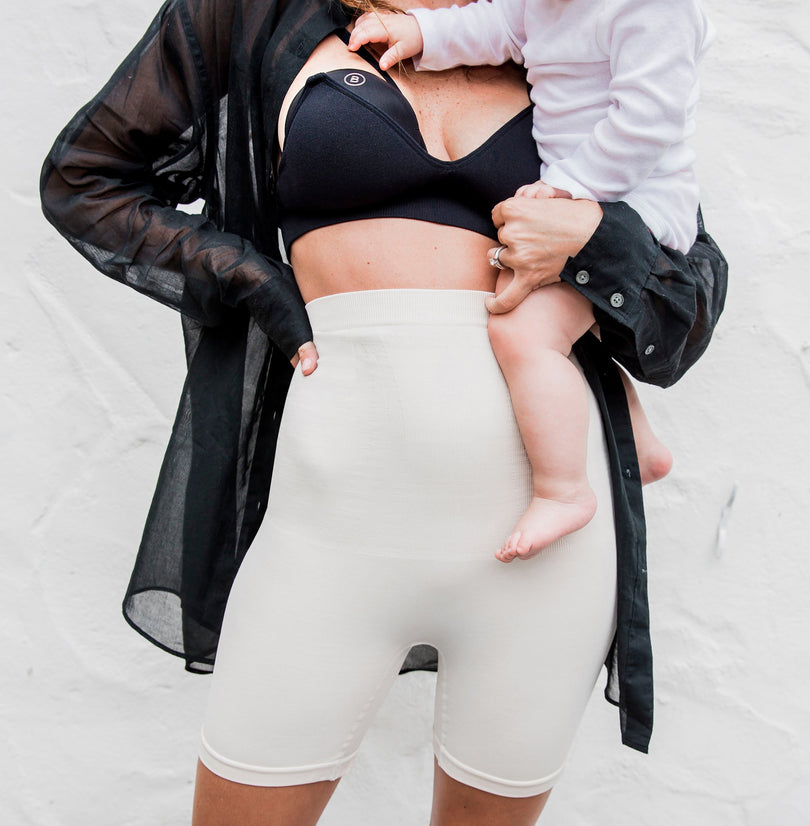Birth and postpartum doula, Sarah Vogel, has dedicated her life to nourishing and nurturing new mamas post-delivery. Home birth mama to two little ones of her own, the care expert dives into “matrescence.” (Aka the transitional period when our bodies evolve from an autonomous human being into a sustainer of life for another). A rebirth of sorts, Sarah stresses the physiological, emotional, and spiritual changes that new mothers undergo, and how important it is to honor the process. From lactation groups to ayurvedic meal deliveries, it’s all here.


Meet Doula Sarah Vogel
Every breastfeeding journey is different. But if there’s one thing you can count on post-delivery, it’s a fluctuating bust-line. Which puts a supportive nursing bra at the top of our list. Tailored for periods of engorgement and weaning, the Cooling Nursing Bra is designed to cradle cup sizes A-D. Not only is this wire-free wonder engineered with breathable, moisture-wicking fabric that helps lower your body temperature, but its intuitively designed with front strap adjusters and clip down construction for easier one-handed feedings.
“Planning for birth without preparing for postpartum is like planning the wedding without preparing for the marriage.”
I’ve heard it said that planning for birth without preparing for postpartum is like planning the wedding without preparing for the marriage. If that ain’t the truth! Although we typically think of the postpartum period as the first 6 weeks after birth, the basic translation of postpartum simply means the time after childbirth. If we think of it in this way then we can more accurately consider the postpartum period to be foundational to the rest of our lives, necessitating preparation and proper care. It is not simply a period where our body figures out how to return to where it was prior to pregnancy but rather a period of transition where our body develops from an autonomous being into the creator and sustainer of life outside of ourselves. We call this period of becoming a mother matrescence, a term coined by anthropologist Dana Raphael in 1975. Like the transitional changes experienced in adolescence, matrescence is the physiological, emotional, relational, spiritual process through which mothers develop, including adoptive or non-biological mothers. Like adolescence, once we journey through matrescence there is no return to our former self. It is worth noting that we undergo these changes with each child, becoming new with each pregnancy, birth and postpartum experience. We are born again into a new life and a new role that requires proper care and nurturing to ensure a strong, stable foundation for the remainder of our lives. If neglected, our newborn bodies are left imbalanced, depleted, and susceptible to illness of both the body and mind.


“Women need more than a brief opportunity to bathe, more than a revolving door of unhelpful visitors....”
Where I often see postpartum care neglected isn’t in the care itself but rather the understanding of what type of care is truly needed to support a newborn mother as she heals and replenishes and adapts to her new body and her new role as Mother. Women need more than a brief opportunity to bathe, more than a revolving door of unhelpful visitors that only ask about the baby and leave without contributing to the care of the mother or the household and more than the 15 minutes of attention she receives at her 6-week postpartum checkup. The answer to what women truly needs isn’t found in our modern ways or our western medicine but rather in the innate wisdom and generations’ old traditions of cultures from around the world. When studied, one will notice a few key cross-cultural themes when it comes to the foundational care of a newborn mother. As we look at these themes let’s consider them within the period of the first 6 weeks after birth, which is a period of time we are all familiar with! So, let’s dive deeper into the areas in which we should truly be focusing when it comes to caring for the newborn mother.


Warmth
Our bodies are in a state of healing during the immediate postpartum time and warmth, as opposed to cold, is the true facilitator of healing. Warmth encourages circulation, lymphatic drainage, increases the release of oxytocin, improves our digestion, and helps our bodies function more efficiently. Cold creates stagnation, forces our bodies to work harder to maintain internal warmth, slows digestion and blood flow and in the context of the mother-baby relationship interferes with thermal and blood sugar regulation. In mother, warmth encourages tissue repair by improving the delivery of oxygen-rich, nutrient dense blood. It’s time to say no to padcicles, my friends. Although they feel delightful and can help with inflammation, they create a roadblock to both the drainage and replenishment of various fluids and nutrients that are vital for tissue and organ healing. From the moment baby is earthside, mother should be wrapped in warm blankets in a warm room and provided with warm fluids and foods. To ease physical discomforts, mama should have a heating pad accessible as well as access to warm herbal baths or a sitz bath. Vaginal steaming is another wonderful option for introducing warmth and healing herbs into the body.
Rest
Somehow rest proves to be one of the most challenging areas to lean into in our culture yet it’s one of the most vital. It took 9 months to grow an entire human being, it’s going to take at least that long to heal and adapt to a new way of life, especially if you’re breastfeeding. Hormones are fluctuating, organs are shifting, the pelvis is reshaping, the brain is undergoing synaptic pruning, the nervous system is continuing to regulate two bodies at once and, if breastfeeding, your body is also creating the sole source of nourishment for another human being. None of this can possibly be accomplished without consequence if rest is not an intentional and significant part of the process. The best ways to ensure rest are to create a nest with all your necessities within arm’s reach. Aside from baby, keep nourishing snacks, water, feeding supplies and comfort tools near the bed and/or accessible in another restful location (guest room, couch, etc.). Have in place support persons that can bring you meals, warm beverages, do the household chores and take any of the extra “stuff” off your plate for the first few weeks after baby. Think of it this way and challenge yourself to stick to it: in and around the bed for the first 2 weeks, in and around the house for the next 2 weeks (small walks in the neighborhood count) and adding in short trips/errands away from the home the following 2 weeks. Delegate tasks ahead of time to designated people and know who you can lean on and for what in times of need. I cannot stress enough what a difference rest will make in the health of your body and brain after baby.


Nourishment
The immediate postpartum period is a period of depletion. Your body has worked tirelessly to grow and is now likely sustaining the life of your baby outside of your womb. As your body works to heal, your digestive system slows down and your reserves of vitamins and nutrients are sucked dry, literally. It is vital that women be intentional about their food and beverage intake in the first few weeks and even months postpartum. Focusing on warm, soft, nutrient dense foods such as broths, soups, stews and rice-based meals will help mama not only keep her digestion working smoothly but will help warm her body, contribute to hydration and help deliver key nutrients to the body. A wonderful project to work on in the third trimester and a great way to intentionally prepare for the postpartum period is stocking the freezer with meals. Additionally, rather than have visitors show up with a meal of their choice, ask them to show up with a meal of YOUR choice. The First Forty Days by Heng Ou, Real Food for Pregnancy by Lily Nichols and Nourishing Newborn Mothers by Julia Jones are my favorite resources to share with mamas looking for helpful information on nutrition and recipes. In addition to stocking the freezer and having friends and family members cook for you, consider hiring a postpartum doula or ayurvedic meal service to keep you well fed and cared for. Do your best to avoid cold, raw foods (yep, hold the salad) for the first few weeks to allow your digestive system to rest and your body to focus on healing
Body Work
An area of care often written off as luxury, woo-woo or simply not beneficial is body work. I’m talking massage, pelvic floor PT, chiropractic care, acupuncture, ayurvedic abhyanga massage, uterine massage, cranio-sacral therapy and more. It is outside of my wheelhouse to speak specifically to each type but the take-home is this: body work releases tension, balances hormones, improves circulation, promotes lymphatic drainage, encourages the proper placement of bones and organs, benefits brain functioning and honors the body of the newborn mother physically, mentally, and energetically. I view body work as a beneficial way for mothers to check in with somebody other than her primary care provider that can assess the state of her mind and body. Most body workers will see mamas far earlier than the standard 6-week primary care check-in, bridging the gap between that visit and the birth of her baby, during which time she’s likely to experience many bodily and mental hiccups. Ideally women should establish care with these providers in pregnancy and seek their continued care postpartum.


Community
We’ve all heard it said that it takes a village to raise a baby but, it takes a village to raise a mother. We need help postpartum, we need to be cared for postpartum and we need others to hold space for us as we process, heal, and navigate our transition through matrescence. If family and friends are an unreliable source of community then I highly recommend looking into local classes such as lactation groups (even if you are bottle feeding!), MOPS, postpartum yoga, local mommy Facebook groups or any mama meetup of the like. Having women in your corner while you journey through the early years of motherhood will help establish a village that will continue to carry you for the rest of your life.
It’s not lost on me that circumstance changes the way this looks for each of us. The scenarios are endless, and the variables are plentiful, but one thing remains true for us all: if we, as mamas, fail to prepare for the postpartum period then we will be setting ourselves up for a far rockier road than we need to endure. Ysha Oakes, a well-known Ayurvedic postpartum care provider puts it this way, “After birth there’s a sacred window of time. A time for complete rejuvenation of a woman’s physical, mental, and spiritual health. A time for deep, extended bonding with her newborn. The first 42 days after birth set the stage for her next 42 years.” So, it’s time we change the narrative of the day of birth being the single most important event that necessitates preparation and start honoring the significance of everyday thereafter.


Generations of wisdom have taught us that there’s much more self-care that lies beyond the 6-week postpartum checkup that western medicine dictates. Let’s not forget to look inward and prioritize warmth, rest, nourishment, and body work as we arrive at this new stage in life. You spent nine months creating new life. Remember mama to be gentle with yourself in this sacred window of time.
Contact Sarah for more information through her website: www.sacredmatrescence.com or Instagram: @sarahvogeldoula






